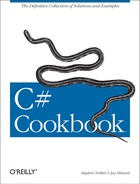You need to control the handling of
the +=, -=,
/=, and *= operators within
your data type; unfortunately, these operators cannot be directly
overloaded.
Overload these operators indirectly by overloading the
+, -, /, and
* operators:
public class Foo
{
// Other class members...
// Overloaded binary operators
public static Foo operator +(Foo f1, Foo f2)
{
Foo result = new Foo( );
// Add f1 and f2 here...
// Place result of the addition into the result variable
return (result);
}
public static Foo operator +(int constant, Foo f1)
{
Foo result = new Foo( );
// Add the constant integer and f1 here...
// Place result of the addition into the result variable
return (result);
}
public static Foo operator +(Foo f1, int constant)
{
Foo result = new Foo( );
// Add the constant integer and f1 here...
// Place result of the addition into the result variable
return (result);
}
public static Foo operator -(Foo f1, Foo f2)
{
Foo result = new Foo( );
// Subtract f1 and f2 here...
// Place result of the subtraction into the result variable
return (result);
}
public static Foo operator -(int constant, Foo f1)
{
Foo result = new Foo( );
// Subtract the constant integer and f1 here...
// Place result of the subtraction into the result variable
return (result);
}
public static Foo operator -(Foo f1, int constant)
{
Foo result = new Foo( );
// Subtract the constant integer and f1 here...
// Place result of the subtraction into the result variable
return (result);
}
public static Foo operator *(Foo f1, Foo f2)
{
Foo result = new Foo( );
// Multiply f1 and f2 here...
// Place result of the multiplication into the result variable
return (result);
}
public static Foo operator *(int multiplier, Foo f1)
{
Foo result = new Foo( );
// Multiply multiplier and f1 here...
// Place result of the multiplication into the result variable
return (result);
}
public static Foo operator *(Foo f1, int multiplier)
{
return (multiplier * f1);
}
public static Foo operator /(Foo f1, Foo f2)
{
Foo result = new Foo( );
// Divide f1 and f2 here...
// Place result of the division into the result variable
return (result);
}
public static Foo operator /(int numerator, Foo f1)
{
Foo result = new Foo( );
// Divide numerator and f1 here...
// Place result of the division into the result variable
return (result);
}
public static Foo operator /(Foo f1, int denominator)
{
return (1 / (denominator / f1));
}
}While it is illegal to try and overload the +=,
-=, /=, and
*= operators directly, you can overload them
indirectly by overloading the +,
-, /, and *
operators. The +=, -=,
/=, and *= operators then use
the overloaded +, -,
/, and * operators for their
calculations.
The four operators +, -,
/, and * are overloaded by the
methods in the Solution section of this recipe. You might notice that
each operator is overloaded three times. This is intentional, since a
user of your object may attempt to add, subtract, multiply, or divide
it by an integer value. The unknown here is which position the
integer constant will be in; will it be in the first parameter or the
second? The following code snippet shows how this might look for
multiplication:
Foo x = new Foo( ); Foo y *= 100; // Uses: operator *(Foo f1, int multiplier) y = 100 * x; // Uses: operator *(int multiplier, Foo f1) y *= x; // Uses: operator *(Foo f1, Foo f2)
The same holds true for the other overloaded operator.
If these operators were being implemented in a class, you would first
check whether any were set to null. The following
code for the overloaded addition operator has been modified to do
this:
public static Foo operator +(Foo f1, Foo f2)
{
if (f1 == null || f2 == null)
{
throw (new ArgumentException("Neither object may be null."));
}
Foo result = new Foo( );
// Add f1 and f2 here...
// Place result of the addition into the result variable
return (result);
}